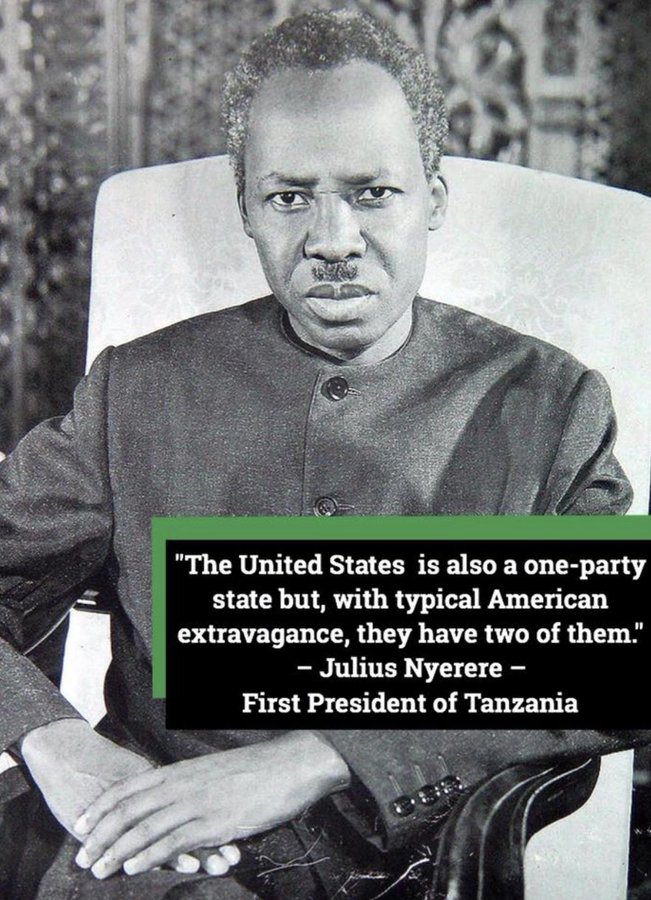Jucheguevara (talk | contribs) (added source) Tag: Visual edit |
Jucheguevara (talk | contribs) (added info about corporate media) Tag: Visual edit |
||
| Line 1: | Line 1: | ||
[[File:Julius Nyerere quote about US political dictatorship .jpg|thumb|278x278px|"The United States is also a one-party state but, with typical American extravagance, they have two of them." - [[Julius Nyerere]]]]'''Corporate duopoly''' is a phrase used to describe the political situation in the modern [[United States (disambiguation)|United States]], where the two ruling parties both serve the same [[Bourgeoisie|corporate interests]].<ref>{{News citation|journalist=Glen Ford|date=2020-10-01|title=Corporate Duopoly Wins Again|url=https://www.laprogressive.com/elections/corporate-duopoly-wins-again|newspaper=LA Progressive}}</ref><ref>{{News citation|title=AMERICA’S TWO PARTY CORPORATE DUOPOLY|url=https://secondthought.us/2021/03/04/americas-two-party-corporate-duopoly/|newspaper=[[Second Thought]]}}</ref> These parties are the [[Democratic Party (United States)|Democratic Party]] and the [[Republican Party (United States)|Republican Party]]. They exist to provide a false sense of "competition" during election | [[File:Julius Nyerere quote about US political dictatorship .jpg|thumb|278x278px|"The United States is also a one-party state but, with typical American extravagance, they have two of them." - [[Julius Nyerere]]]]'''Corporate duopoly''' is a phrase used to describe the political situation in the modern [[United States (disambiguation)|United States]], where the two ruling parties both serve the same [[Bourgeoisie|corporate interests]].<ref>{{News citation|journalist=Glen Ford|date=2020-10-01|title=Corporate Duopoly Wins Again|url=https://www.laprogressive.com/elections/corporate-duopoly-wins-again|newspaper=LA Progressive}}</ref><ref>{{News citation|title=AMERICA’S TWO PARTY CORPORATE DUOPOLY|url=https://secondthought.us/2021/03/04/americas-two-party-corporate-duopoly/|newspaper=[[Second Thought]]}}</ref> These parties are the [[Democratic Party (United States)|Democratic Party]] and the [[Republican Party (United States)|Republican Party]]. They exist to provide a false sense of "competition" during election seasons. | ||
The "first past the post" electoral system makes it difficult for third parties to compete for political power. In other [[Dictatorship of the bourgeoisie|bourgeois dictatorships]] (so-called "liberal democracies") such as those in Europe, there are far more political parties represented in parliaments and congresses. | The "first past the post" electoral system makes it difficult for third parties to compete for political power. In other [[Dictatorship of the bourgeoisie|bourgeois dictatorships]] (so-called "liberal democracies") such as those in Europe, there are far more political parties represented in parliaments and congresses. | ||
Given the shared ownership, the [[corporate media]] loyally serves the political interests of the corporate duopoly. This is evident by the demonization of those who challenge the status quo; ranging from communists, socialists, left-liberals like [[Bernie Sanders]], and even free-market libertarians like Ron Paul whose anti-war positions threaten the war profiteers. | |||
== References == | == References == | ||
Revision as of 16:26, 22 March 2022

Corporate duopoly is a phrase used to describe the political situation in the modern United States, where the two ruling parties both serve the same corporate interests.[1][2] These parties are the Democratic Party and the Republican Party. They exist to provide a false sense of "competition" during election seasons.
The "first past the post" electoral system makes it difficult for third parties to compete for political power. In other bourgeois dictatorships (so-called "liberal democracies") such as those in Europe, there are far more political parties represented in parliaments and congresses.
Given the shared ownership, the corporate media loyally serves the political interests of the corporate duopoly. This is evident by the demonization of those who challenge the status quo; ranging from communists, socialists, left-liberals like Bernie Sanders, and even free-market libertarians like Ron Paul whose anti-war positions threaten the war profiteers.
References
- ↑ Glen Ford (2020-10-01). "Corporate Duopoly Wins Again" LA Progressive.
- ↑ "AMERICA’S TWO PARTY CORPORATE DUOPOLY". Second Thought.